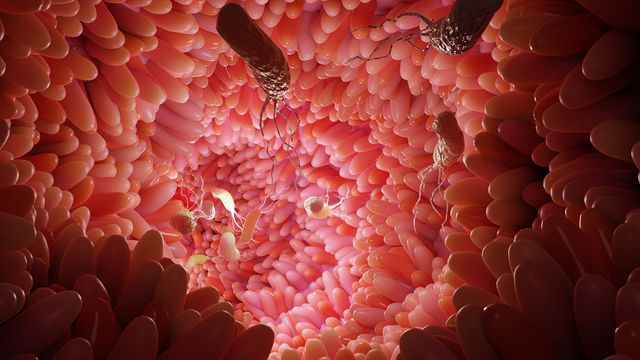New Therapeutic Approach Proposed for Inflammatory Bowel Disease Through Microbial Regulation
In a groundbreaking study published in Cell Host & Microbe, researchers have identified a novel therapeutic approach for treating inflammatory bowel disease (IBD) through the regulation of microbial factors. The research team, led by Prof. PAN Wen from the University of Science and Technology of China, discovered a causal link between microbial metabolites and the dysfunction of intestinal stem cells (ISCs) in colitis. This discovery has paved the way for a potential treatment strategy to restore ISC function in patients with colitis.
The study focused on the role of the α2A-adrenergic receptor (ADRA2A), a highly expressed G-protein-coupled receptor in ISCs, in the development of colitis. Researchers found that a microbial metabolite called tyramine, produced by the gut commensal Enterococcus bacteria, directly activates ADRA2A in ISCs. This activation leads to the suppression of ISC proliferation and impairs epithelial regeneration, exacerbating colitis symptoms.
To test their hypothesis, the researchers used an engineered Enterococcus faecalis strain lacking the ability to produce tyramine and observed a significant improvement in colitis symptoms in mice. Additionally, treatment with yohimbine, an ADRA2A antagonist, showed promising results in ameliorating DSS-induced colitis in animal models.
This study sheds light on the intricate relationship between microbial factors and ISC dysfunction in colitis and offers a potential therapeutic target for treating IBD. By targeting the Enterococcus-tyramine-ADRA2A axis, researchers hope to restore ISC-driven epithelial regeneration and alleviate colitis symptoms in affected individuals.
Microbial Metabolites and Intestinal Stem Cell Dysfunction: Key Players in Inflammatory Bowel Disease
A recent study published in Cell Host & Microbe has uncovered a crucial link between microbial metabolites and the dysfunction of intestinal stem cells (ISCs) in the development of inflammatory bowel disease (IBD). Led by Prof. PAN Wen from the University of Science and Technology of China, the research team demonstrated how a microbial metabolite, tyramine, produced by Enterococcus bacteria, directly impacts the function of ISCs in the gut.
The study revealed that tyramine activates the α2A-adrenergic receptor (ADRA2A) in ISCs, leading to the suppression of ISC proliferation and impaired epithelial regeneration. This disruption in intestinal tissue regeneration exacerbates colitis symptoms in affected individuals. By targeting the Enterococcus-tyramine-ADRA2A axis, researchers were able to propose a potential therapeutic approach for treating colitis and restoring ISC function.
The findings from this study highlight the critical role of microbial factors in the pathogenesis of IBD and offer new insights into the development of targeted therapies for this chronic inflammatory condition. By understanding how microbial metabolites influence ISC function, researchers may pave the way for more effective treatments for individuals suffering from IBD.
Novel Treatment Strategy for Colitis: Targeting the Microbial Regulation of Intestinal Stem Cells
In a significant breakthrough for the treatment of colitis, researchers have proposed a novel therapeutic approach that targets the microbial regulation of intestinal stem cells (ISCs). A study published in Cell Host & Microbe, led by Prof. PAN Wen and his team at the University of Science and Technology of China, unveiled the role of microbial metabolites in the dysfunction of ISCs in colitis.
The research team identified tyramine, a microbial metabolite produced by Enterococcus bacteria, as a key player in the suppression of ISC proliferation and impaired epithelial regeneration in colitis. By blocking the Enterococcus-tyramine-ADRA2A axis, researchers were able to restore ISC-driven epithelial regeneration and alleviate colitis symptoms in animal models.
This innovative treatment strategy offers new hope for individuals suffering from colitis, a chronic inflammatory condition that affects millions of people worldwide. By understanding the intricate relationship between microbial factors and ISC dysfunction, researchers may revolutionize the way colitis is treated in the future.

